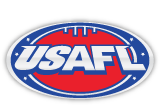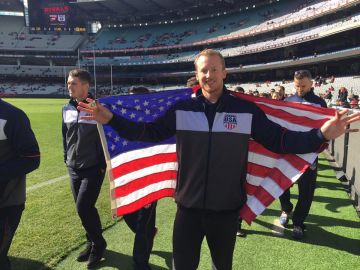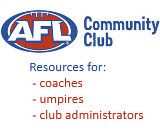That Was the Season That Was: 2017
|
|
“Passion is what gets you through the hardest times that might otherwise make strong men weak, or make you give up.” – Neil deGrasse Tyson
Every year that plays out across our lives is different. They each have their different vibe, a multitude of personalities, and varying array of landmarks, both good and bad. Each footy season is a micro chasm of our broader life, though that too is in varying degrees. For this game of Australian rules football is not simply a hobby, a thing we do on the weekends.
For the men and women who take up this game, be it here in the United States, across the Pacific in the game’s birthplace, or in vast continents and minute archipelagos around the globe, this sport is the lifeblood running their veins. And the opportunity to get out and chase a big red ball on a field, and the friends and family that they’ve made from that is why we keep coming back for more.
This is the story of season 2017; its ups, its downs, and the continued passion of those who play the game here in the US and abroad.
MAKING HER-STORY
From the very beginning of the year, new ground was broken in the sport. AFLW, the first major professional women’s football league in Australia, kicked off in Melbourne. In front of a lock-out crowd of more than 22,000 fanatics at Ikon Park, and nearly half-a-million on TV, more than even the loudest of supporters could have even dreamed of, Darcy Vescio and Carlton account for Moana Hope and Collingwood. As the season wore on, two teams rose to the top – Brisbane, led by one-time Boston Demon Jessica Wuetschner, and Adelaide, keystoned by folk hero forward Sara Perkins. The Crows won title, but footy was the real winner, leaving fans thirsting for more, and excited about the growth of the league that is coming ‘round the bend.
The growth of women’s footy this year was not limited to just AFLW, however. Not by a longshot. Three clubs would add women’s programs in 2017: Los Angeles, Dallas, and Houston. Seattle and Philadelphia, both of which made their women’s debut last year, saw extensive growth in their programs, as did established teams in Portland, Columbus, Boston, Arizona, and Baltimore-Washington. And, the North Star Blue Ox became the first independent women’s club in the USAFL.
The established clubs all grew as well, strengthening the competition. All told, more than 400 women took to the field in 2017 representing 19 USAFL member clubs, both new records.
FOOTPRINTS IN AUSTRALIA
While AFLW’s beginnings and the start of a memorable 2017 AFL campaign were underway, our own Katie Klatt and Tyler Ames were continuing their footy journeys.
After playing out 2016 in the reserves ranks for Melbourne University, Klatt made her senior debut with the VWFL side and made an appearance in over half of the Mugars’ games. The Virginia native then made history as part of the first North Melbourne women’s side, which played an exhibition match in February at historic Arden Street Oval, and assisted on three goals in the Kangaroos win. With North set to join AFLW in 2019, there is hope that scouts will have Klatt on their radar.
Ames, meanwhile, traveled abroad as part of the USAFL’s player exchange program, landing first with the Darwin Buffaloes of the NTFL, then with Montrose of the Eastern Football League. Ames, who began with the Denver Bulldogs in 2015, was praised by his teammates in Darwin for his “enthusiasm for the game and his willingness to put his body on the line against more experienced opponents, and received similar accolades during his stint with the Demons.
The relationship formed through the auspices of Mark Motlop in Darwin, and through Rod Buncle and Tony Fairhead of the USAFL Advisory Board, will continue into 2018. Portland Sockeyes and Freedom midfielder Jessica Blecher will head to Darwin for a stint with the Buffaloes, and she looks to make the same impact that Ames had in the Northern Territory.
DO FOOTY PLAYERS DREAM OF FERMENTED SHARK?
Come March, USAFL clubs stirred from their slumber and began moving forward with their 2017 seasons. Though the Baltimore-Washington Eagles got a head start on everyone, spending the winter in the weight room and then heading up to Reykjavik to compete in the first ever Arctic Cup. It was clean sweep for the Eagles, as the men defeated teams from Sweden, Canada, and London, while the Lady Eagles accounted for the SE London Giants, all in weather that harsher than Gilbert Godfried’s voice. The gathering was a success, and the next Arctic Cup is already being planned for Sweden next year.
The trip to Iceland capped off a big year for the Birds of the Beltway, as they returned to Division 1 for the first time since 2011. The growth of the team over the past several years in two metropolitan areas led to the consideration of possibly expanding into two clubs. In November, the decision was made official, thus ending twenty years of BWE Eagles football, but being born with it the bright vision of two new futures: the DC Eagles and Baltimore Dockers.
DECISION TIME IN DALLAS
Looming large in the background was the 2017 AFL International Cup in Melbourne, and Liberty Australian tour. As August raced faster and faster like a greyhound approaching his meal, time closed in fast for the participating players. In May, over 100 athletes converged on Dallas for the final National team camps.
The Freedom and Liberty teams had, for the most part, been decided barring a couple of last minute additions, and Leigh Barnes, Judith Stein and the rest of the coaching staffs summoned their charges to put them through their paces and bond ahead of the trip down under. For Tom Ellis and the Revos, however, more than 60 men converged on Big D with the intent of cementing their spots on the IC17 roster, while others would fight to earn places towards next year’s European trip.
All three sets of players emerged ready for the big trip and looking to make history in their own ways. But first came the business of the USAFL season.
THE MAGICAL MYSTERY FOOTBALL TOUR OF MYSTERY
Traversing three time zones over the course of a month, the Regional Tournament Series went to three cities with differing Aussie Rules backgrounds. The carnivals in Little Rock, Raleigh, and Denver foreshadowed a changing of the guard in the men’s game.
It started in June, where more than 200 locals embracing the newest sport to invade Arkansas paid witness to the end of the Austin Crows’ long winning streak. The Dallas Magpies became the first team to knock off a perennial regional power, and a fortnight later Baltimore-Washington became the next. The Eagles’ thumping victory over New York left the door open for Golden Gate to assume the mantle of the country’s top team.
With newly minted Revo captain Kyle Johnson and rookie sensation Cody Burman leading the way, the Roos cut through Los Angeles and Orange County before needing a come from behind victory over homestanding archrival Denver to come out with their third straight Western title. That weekend also saw the Lady Bulldogs get some revenge over San Francisco for 2016’s defeat at Nationals, and the Seattle Grizzlies women emerge as a burgeoning side.
WE COME TO THE LAND DOWN UNDER, OH YEAH YEAH
Three years after the Revos, Freedom, and Liberty invaded Melbourne, it was time for them to do it all over again. The Americans were among a record 26 teams to compete in the sixth iteration of the AFL International Cup, and the Revos and Freedom came to the home of football with the hopes of a nation on their broad, athletic shoulders. The Liberty arrived to test their mettle against a veritable cornucopia of local women’s teams from around Melbourne, looking for their first ever win in the process.
Despite both the Revolution and Freedom finishing in fourth place in their respective division, both teams represented the country and the program well. Commentators and local spectators alike remarked at the excellence of the standard displayed by both teams. Said excellence was rewarded tangibly: six Americans were named to the IC17 All-World Team, with Ben Carpenter-Nwanyanwu taking out the Men’s D1 MVP.
The Liberty, meanwhile, captured that elusive first win on game number two of the tour, then followed up with two more notches to finish with a winning record. They too impressed those that flocked to local grounds to see them play, among them a number of AFLW players.
More important than wins and losses, however, those that came in the American contingent wove themselves within the fabric of the footy community. Not just the local one which permeates most of the souls who love this game, but those who, like themselves, had come from all over the globe to compete and do the same.
OUT HERE HAVING FUN, IN THAT WARM CALIFORNIA SUN
When the players, coaches, and your humble author returned back stateside, we were all staring down the barrel of the USAFL season’s homestretch, and the first Nationals to be held in California since 2000. Indeed, San Diego played host to the largest championships in its 21 year history. 53 teams, seven divisions, and nearly 1200 players.
The emergence of the western regional teams to the fore bubbled over on that weekend in October. Each of the seven divisions had at least one Western team in their top two. Even the hometown Lions got in on the act, bravely falling to the Seattle Grizzlies in the Men’s Divvy 3 Grand Final.
But the weekend belonged to the Golden Gate AFL. The San Francisco Iron Maidens defied all of the nay-sayers to repeat as women’s D1 champions, turning back the sound and fury of the Lady Bulldogs by eight points. Then the Roos men broke their D1 duck with a resounding win over the Los Angeles Dragons in the men’s decider. Both teams are early favorites to be tops next season, but they don’t play footy on paper.
And so, the final hours of 2017 are upon us. And with it, so goes the 20th anniversary year of the USAFL. 2018, like any new year will have very many questions awaiting us. The Earth, knowing not the difference, goes about its appointed duty of spinning and we make our own way. In a few months we’ll be kicking off the snow and frost – most of us have kept moving to prevent that. But spring will be here again, and we’ll be here playing our favorite game too. The Parallel Cup, and the pursuit of October glory awaits us all again.
Farewell 2017. And thank you to you, our footy family, fans and friends, for making it so memorable. May your passion for this great game beat stronger than a garlic milkshake, and I'll see you in 2018.
|
|
|






